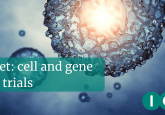AACR16: Genomic profiling could advance research for poorly responsive gynecologic cancers

A team of researchers from Rutgers Cancer Institute of New Jersey (NJ, USA) have demonstrated that genomic profiling can help to identify alternative and targeted treatments for hard-to-treat gynecologic cancers. Their results were presented recently at the American Association for Cancer Research Annual Meeting 2016 (held 16–20 April, LA, USA).
Rutgers Cancer Institute Precision Medicine Director Lorna Rodriguez explained, “Unfortunately, due to the lack of screening mechanisms for many gynecologic cancers, they are often diagnosed at an advanced stage, thus leading to poor treatment response with standard therapies in many cases.”
The team analyzed samples from 69 patients with gynecologic cancers that failed to respond to treatment. Next-generation sequencing technology was utilized in collaboration with Foundation Medicine, Inc (MA, USA). The results of the study demonstrated that on average there were 4.97 genomic alterations per tumor.
The mutations were reviewed by a board, known as the molecular tumor board, made up of clinicians, scientists, statisticians and pathologists. The board recommend that patients were enrolled in a clinical trial, treated with an approved cancer therapy or treated with a therapy approved for other uses. Of the patients who implemented recommendations from the board, 56% showed a response of clinical benefit.
“Through genomic profiling, we’re identifying alterations that may not have otherwise been visible through standard laboratory testing. Coupled with a review of these results by experts on a molecular tumor board, the opportunity exists to identify novel therapies that would target specific abnormalities,” explained Shridar Ganesan, lead author of the study.
Source: Rutgers Cancer Institute of New Jersey press release




